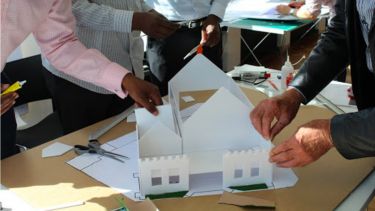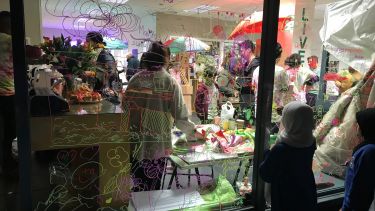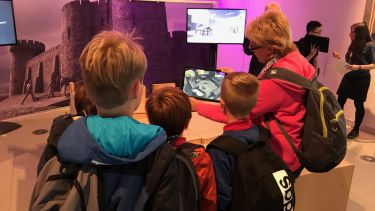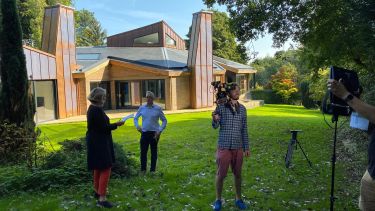Pedagogy, Practice and Scholarship
Supporting our University Teachers to make the most of scholarship opportunities to enhance our teaching and create disciplinary knowledge through a diverse range of specialisms and methods.

The Pedagogy, Practice and Scholarship group supports all of SSoA’s University Teachers to make the most of scholarship opportunities to enhance our teaching and create disciplinary knowledge through a diverse range of specialisms and methods. The group aims to celebrate the excellent scholarship that already enriches our teaching, and to focus on how we can support individual specialisms, foster collaborations inside and beyond the department, and strengthen links to practice.
Scholarship is the mechanism by which we keep our teaching relevant and innovative, disseminate the excellent work of our students to the external world, and explore routes for future practice. The group’s outputs reflect the diverse range of themes, specialisms and interests of the membership. Mapping the group’s work reveals the following thematic fields; material cultures, building performance, placemaking, pedagogy research, participation, history and representation. These themes are connected via the overarching ambitions to develop an integrative teaching approach to the climate emergency and an intersectional approach to inclusion, equality and diversity.
The type of scholarship outputs are just as varied as our interests and can include; exhibitions, publications, presentations, portfolios, design projects, research, buildings, workshops and public engagement activities. We bring critical reflection to our activities in order to make our activities relevant and transferable to other teaching contexts in other schools of architecture and beyond.
We strive to embed the key themes of sustainability, social engagement, design quality and enquiry-based learning in our scholarship. Our work is often produced in collaboration; with each other, our students, our research colleagues, and external partners in the community and in practice. SSoA scholarship outputs have informed future and alternate practice, methods of architectural teaching, and the civic role of the school of architecture, both national and international levels.
Scholarship themes
- Architectural pedagogy
-
Sheffield School of Architecture has an international reputation for exploring innovative approaches to learning and teaching. Much of our scholarship is based upon reflection of our own learning & teaching practice and is often done in collaboration with students. We explore how innovations in education can critique, expand and transform architectural practice and our scholarship is helping to shape how architectural education responds to contemporary issues such as decolonising the curriculum.
- Participation
-
A belief in architecture as participatory practice is central to our pedagogy at SSoA. Scholarship activities seek to promote, celebrate and explore new forms of engagement in and co-production of the built environment, through meaningful live collaborations. Our activities involve enhanced student learning experiences, real life scenarios and 3rd sector organisations.
- Material cultures
-
In our teaching and scholarship we engage with pressing contemporary issues whilst recognising the significance of the past, exploring in detail the material interface and transition between old and new. We critically explore the enduring heritage of place, both cultural and material, considering long-term issues of identity, continuity and change. Our scholarship explores how existing material cultures can forge new sustainable and meaningful relationships between people and place.
- Building performance
-
The climate emergency requires a significant shift in how we practice architecture and how our buildings perform into the future. A radical re-thinking of the curriculum for the next generation of architects is needed. Our scholarship activity connects pedagogy with design practice for climate change mitigation and adaptation.
- Placemaking
-
A contextual response informs much of the work at SSoA. The connection between our buildings and the places in which they are located is fundamental to creating socially engaged and sustainable environments. Our scholarship activities connect historical understanding of existing communities with explorations into what the future agendas will be in our towns and cities.
- History and representation
-
Our research and pedagogy increasingly looks beyond the conventional western canon of architectural history to explore cross-cultural traditions and indigenous architectures. It also fundamentally questions architectural history understood as a succession of styles, focusing instead on the study of the development of building types, social and cultural meaning, and environmental response. A case study methodology that investigates specific examples in depth is a key technique in developing this new approach.
Scholarship projects
2014-ongoing: SSoA’s pioneering public-facing project office and the UK’s first permanent University-funded Urban Room.
2015 ongoing: Live Works set up this national network that emerged from a recommendation by The Farrell Review of Architecture and the Built Environment 2014.
- Feminist Teachout
2020: Teaching staff and students came together to explore the 'Feminist School of Architecture', sharing feminist activity within the school and planting ideas for further initiatives, such as the SSoA Feminist Library (see case study below)
An interdisciplinary research project exploring how students and staff used and perceive learning spaces around the University of Sheffield Campus.
2018: AHRC funded project (£75k), using AI to engage people in past, present and future of heritage site.
2014-ongoing: working with Sheffield City Council, community groups and local businesses to develop a community-led masterplan for the regeneration of the Castle site.
2015-20: AHRC funded project with The GlassHouse Community-Led Design and The Open University.
Featured projects
Funding: ESRC (UK), JPI-Urban Europe (EU)
Award value: £327,000 (UK component)
Urban Education Live (UEL) aims to contribute to the making of inclusive, vibrant and accessible urban communities. The three-year project brings together university partners from Finland, the UK, Slovenia and Romania to develop and test new models of collaboration between universities, urban communities, NGOs and public bodies.
Staff involved: Carolyn Butterworth, Maša Šorn
The SSoA Feminist Library aims to consolidate the feminist work that has been conducted over the last twenty years in the Sheffield School of Architecture, to make visible the work of students and staff to a wider community, and contribute to its future development. The library includes an archive, in which outputs produced by staff and students are documented and stored, complemented by initiatives, events and interviews. The Library also contains a more live component presenting new events, activities, and debates in relation to intersectional feminist topics. The SSoA Feminist Library aims to be an online public resource, and to contribute to the future agenda of feminist pedagogy and research at the School.
Staff involved: Cith Skelcher, Carolyn Butterworth, Noelia Botana, Emma Cheatle, Luis Hernán, Doina Petrescu
Climate Emergency Curriculum
The development of an RIBA publication responds to the climate crisis and the UK’s target of achieving climate neutrality by 2050. This project is in partnership with Aarhus School of Architecture and Tampere University and is set in the context of Denmark and Finland’s more ambitious targets. These ambitious carbon neutral goals can only be unlocked through well planned and executed designs of new buildings, neighbourhoods, and cities, and the careful and effective (re)design of the built environment we have created thus far. This will mean a significant shift in how we practice architecture, and by extension a radical re-thinking of the curriculum for the next generation of architects is needed.
Staff involved: Aidan Hoggard
Pedagogy, Practice and Scholarship Staff on TV
Howard has worked with TV Architect George Clarke on the Channel 4 series Ugly House to Lovely House since 2017. The work focuses on the transformative power of good architecture on everyday life. Howard's work on the current series looks specifically at how every project should be seeking to respond to the climate crisis through the careful choice of materials, insulation, and use of natural light and water. Whilst many people are aware of climate change, they are unaware of how they can tackle it in the work on their own project. Clear dissemination of how we can work to make more responsible, climate sensitive buildings is at the core of Howard's practice based work and forms the basis of much of his lecture and studio based teaching. The next episode to air in late 2020.
Satwinder works as an onscreen designer on The Dengineers, a CBBC TV production where children help to design and build their very own dream den. The show is based on an educational premise where both architectural, engineering and design principles are discovered and explained. The work feeds directly into his teaching where he encourages his students to understand how ideas and design can be disseminated both within and outside the profession. The show has aired on BBC2, CCBC and is on BBC iplayer. In 2019 the show was awarded a prestigious BAFTA and has been taken up by various TV networks across the globe.
Group members
- Simon Baker
- Matthew Bradshaw
- David Britch
- Isabel Britch
- Sam Brown
- Carolyn Butterworth
- Leo Care
- Simon Chadwick
- Wei Shan Chia
- Mark Emms
- Howard Evans
- Ian Hicklin
- Aidan Hoggard
- Dan Jary
- Russell Light
- Stuart McKenzie
- Mark Parsons
- John Sampson
- Satwinder Samra
- Cith Skelcher
- Eva Sopeoglou
PhD Students
Carolyn Butterworth: Tom Moore (Co-Supervisor), Claire Tymon (2nd Supervisor)



